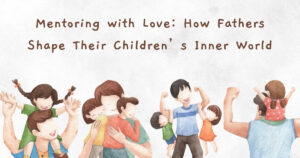Fathers as Mentors: Guiding Intellectual and Emotional Growth

A father’s involvement lays the groundwork for a child’s future development while offering a sense of safety and support. According to research, babies with calm, focused fathers tend to perform better on cognitive development tests. Fathers who actively encourage learning at home by reading to their kids, doing puzzles, or having meaningful interactions with them as they get older help them develop their language and critical thinking skills.
Fathers who are emotionally involved are associated with better self-control. Children learn how to handle stress and comprehend emotions when their fathers react empathetically when they are having tantrums or are disappointed. Additionally, research shows that fathers’ tough but caring parenting reduces adolescent behavioral problems, substance abuse, and depression risks.
Involving fathers in story time, art projects, or outdoor play might have a significant positive impact on preschoolers’ language, social skills, and emotional fortitude in India. These times strengthen ties that go beyond school, strengthening the friendships and camaraderie within the family. This Father’s Day, let us celebrate fathers for their mentoring and guidance of children toward better, more balanced futures, in addition to the things they provide.
Beyond the Role of Provider: How Fatherhood is being redefined
Historically perceived as providers or enforcers of discipline, modern fathers are increasingly embracing roles that encompass emotional coaching, intellectual engagement, and character development. This transformation is crucial. Studies consistently indicate that engaged fathers lead to enhanced academic performance, improved self-esteem, and superior emotional regulation in their children.
 A father who acts as a mentor does more than respond to inquiries he spark them. He does not merely provide comfort during challenging emotions—he assists in navigating them.
A father who acts as a mentor does more than respond to inquiries he spark them. He does not merely provide comfort during challenging emotions—he assists in navigating them.
Curiosity and Critical Thinking: Whether it involves solving puzzles, discussing current events, or constructing projects together, these experiences prompt children to inquire “why” and “how”—establishing a basis for lifelong education.
Role Modeling Continuous Learning: Children who observe their fathers engaging in reading, questioning, or acquiring new skills understand that intelligence is not static it is developed.
Encouragement Rather than Solutions: A mentoring father prioritizes the journey over perfection. Instead of supplying all the answers, he empowers his children to think critically and seek out solutions.
Fostering Emotional Intelligence: Children with high emotional intelligence are likely to evolve into empathetic, self-aware adults. Fathers play a crucial role in this development:
Demonstrating Emotional Expression: When fathers candidly share their feelings—whether joy, frustration, or sadness—they teach children that emotions are a natural part of being human.
Challenges and Opportunities
Being a mentor-father is not always straightforward. Professional demands, personal challenges, and societal pressures can pose obstacles. However, even minor, consistent actions such as daily check-ins, active listening, or sharing personal experiences can lead to a significant impact.
Fathers also gain from this relationship. Mentorship necessitates self-awareness and personal growth, prompting men to reflect on their values, actions, and emotional intelligence—thereby fostering a mutual journey of development.

Conclusion: The Lasting Impact
In a world that frequently appears chaotic and fast-moving, a father’s role as a mentor serves as a stabilizing influence. His impact resonates throughout his children’s lives—shaping their thoughts, feelings, and interactions with the world. When fathers purposefully mentor with love, patience, and curiosity, they are not merely raising children—they are nurturing thoughtful, emotionally intelligent individuals who will eventually become mentors themselves.
Thus, this Father’s Day and every day let us honor and support fathers who guide not only with their hands but also with their hearts and minds.








